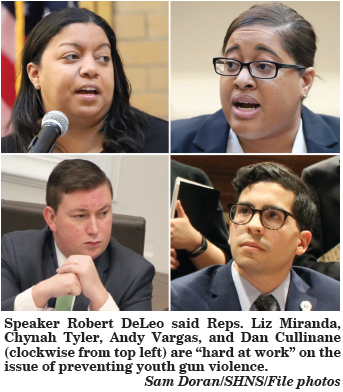June 13, 2019

Doctors and state officials on Monday called for a concentration on addressing the causes of gun violence as well as its after-effects as they marked the opening of a new gun violence prevention center at Massachusetts General Hospital.
Dr. Peter Masakios, an MGH surgeon who will lead the Center for Gun Violence Prevention with Dr. Chana Sacks, said the approach doctors take to stemming gun deaths and injuries should be no different than past efforts to prevent deaths from car crashes and smoking.
“We have been trained to care for the worst traumatic injuries in some of the worst circumstances to save lives, and we are doing this well,” Masiakos told a crowd that had gathered on the hospital’s campus Monday morning. “However, many of my fellow health care providers believe that we are not only in the business of preventing death after injury. We also share a special obligation to better understand the causes, the social determinants, of these injuries, and to prevent them from occurring in the first place.”
House Speaker Robert DeLeo suggested youth gun violence as one specific area lawmakers will explore, saying Reps. Chynah Tyler, Liz Miranda, Andy Vargas, and Dan Cullinane “are already hard at work on this issue.”
“Legislation relating to firearms and supporting behavioral health among young people will be part of our discussion as we move forward,” he said. “This session we expect further conversation on what we can do in Massachusetts on our legacy of progress strengthening our gun laws.”
After the event, DeLeo told the News Service he did not have any specific bill in mind at this point in the two-year term. “But,” he said, “some of the members have spoken to me that they have ideas in terms of how we can better what we’ve done here in Massachusetts, and so I told them that we’re looking forward to discussing it with them.”
On the heels of a 2014 reform that gave police chiefs more discretion over gun licensing, Massachusetts in 2017 banned bump stocks like the ones used in the mass shooting in Las Vegas, and last year passed a “red flag” law that allows family members to petition the courts to suspend gun ownership rights of someone they believe to be a danger.
“Looking ahead, we’re looking into how we can better trace weapons, deal with weapons and guns from out of state, and support ongoing efforts to ensure safe and supportive schools,” DeLeo said.
DeLeo said afterwards he thinks the conversation about preventing gun violence “is going to be an ongoing issue, unfortunately very similar to the opioid discussion that we’re having.”
Suffolk District Attorney Rachael Rollins called gun violence a “public health epidemic” and said that there have been 17 homicides, including 14 with guns, in the six months she has been in office. She told Mass. General officials she would be a “loud and active” partner in their efforts.
“Guns steal more lives than any other weapon combined, and that number doesn’t even begin to quantify the harm that gun violence inflicts on communities,” she said.
Dr. Monica Bharel, the state public health commissioner, said her department is for the first time “explicitly addressing gun violence through a public health and racial equity lens.” She said a black youth in Massachusetts is 32 times more likely to be hospitalized for a firearm injury than their white counterpart.
“Where you live or the color of your skin should not determine whether you develop asthma any more than it should determine whether you face premature death as a consequence of gun violence,” Bharel said.
Earlier this month, the DPH awarded a two-year, $700,000 grant to Lowell’s UTEC Inc. to establish a Gun Violence Training Center for Excellence to help 10 community organizations create pilot prevention programs in neighborhoods with higher rates of gun violence.
The new Mass. General center will focus on research, clinical care, education and community engagement, according to the hospital, which provided $1.2 million in seed funding. Harvard Medical School is providing an additional $200,000.
Sacks, one of the center’s two directors, is a cousin of Mark Barden, whose seven-year-old son Daniel was one of the 20 students killed in the 2012 shooting at Sandy Hook Elementary School in Newtown, Conn.
After that shooting, Sacks said, she “witnessed the worst pain I’ve ever seen up close.”
She said the issue of gun violence breaks down into four different problems -- the mass shootings that “grip our national attention”; the homicides and assaults that disproportionately affect communities of color and “way too often don’t make the news”; unintentional injuries; and suicides, which she categorized as “the least talked-about type of gun violence.”
Mark Barden, who spoke alongside Attorney General Maura Healey, said he was “filled with so much hope that families won’t be having to endure the pain that our families will endure forever thanks to the good work that’s being done today.”


